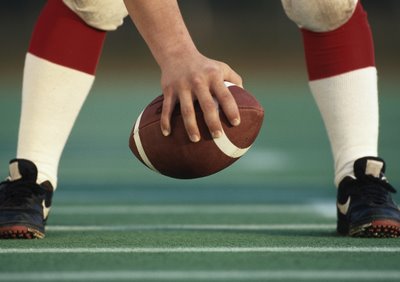Scarlet and Gray (And a Little Green, Too)
by Ryan Knapp I don't know what I did to deserve such good fortune, but for some reason, God saw fit to allow me to be born in the state of Ohio. Growing up a Buckeye, you learn early in life that blue is a four-letter word (maize might as well be also), and that all good things come packaged in red sweater vests.
I don't know what I did to deserve such good fortune, but for some reason, God saw fit to allow me to be born in the state of Ohio. Growing up a Buckeye, you learn early in life that blue is a four-letter word (maize might as well be also), and that all good things come packaged in red sweater vests.It is also my good fortune that Ohio State will be playing the college football national championship game in New Orleans this January, as I will be in town attending the ASSA meetings*, and thus will naturally be attending the game shortly thereafter.
The teams are set: OSU vs. LSU. The only big question left is—what will I pay for the privilege of watching them duke it out? I'm not counting on getting a ticket from the lottery drawing, so I plan to buy a ticket from a reseller. For your typical fan, buying tickets from resellers is the norm for big games like this. It is not uncommon for these tickets to be sold for 5 to 10 times their face value in the resale market.
Some games are unexpectedly good (see Browns vs. Bills this Sunday in an unlikely battle for a playoff spot, or the recent Missouri vs. Kansas game as #1 and #2). With these games, it's easy to see why the resale market would dominate—most tickets were sold cheaply early in the season before anyone realized the game would be so meaningful. When demand rises, so do prices.
The explanation isn't so straightforward, however, for games that are guaranteed to be important (like the national championship). In this article, ESPN writer Gregg Easterbrook discusses some reasons why tickets are still sold by sports teams at face value, regardless of expected market rates.
*A big economics conference. There is a good chance your professor is going. Maybe they'll buy you a hat.
Discussion Questions
1. Fairness is always an issue with pricing decisions. Easterbrook calls it a “public relations move” to keep prices standard. Might raising prices for important games create resentment that could extend forward into the months and years to come?
2. In his autobiographical Fever Pitch, Nick Hornby writes that club owners would be daft to raise prices beyond what their rabid fans can readily afford, since the marginal fan comes to games as much to see and experience these crazed fans as to see the action on the field. How would raising the price affect the demographics of those who could attend? Do rabid fans confer a positive (or negative) externality on the rest of the crowd?
3. Last Monday night, Michael Vick and the Falcons took on Reggie Bush and the Saints in an epic battle for the NFC South. Oh, wait, nevermind—neither of these once-great teams is likely to even smell the playoffs this year, and neither of those players were even on the field to try and help the cause (Bush is injured, Vick is in prison). How might setting prices upfront allow teams to capture more total revenue on games that turn out to be duds?
Labels: Arbitrage, Supply and Demand



3 Comments:
At 3:46 PM, January 25, 2008, SweetSimz
said…
SweetSimz
said…
This comment has been removed by the author.
At 1:40 PM, January 27, 2008, SweetSimz
said…
SweetSimz
said…
I believe that, though it may seem very unfair to the fans, the rising prices are quite reasonable in such situations as these. The tickets that are bought early on in the season are sold cheap because there is no promise as to what the outcome of the match of the championship will be; meaning there is no guarantee as to which teams will face off in the final game, so many of the fans do not know the worth of the tickets yet. Therefore, because of this uncertainty, tickets are sold cheaper because the demand at that time is low for the championship tickets. As it is, no one wants to pre-buy tickets for a game in which the players are not yet determined. As the season continues though, the teams are set to play the championship game, and the fans of each team will definitely want to go, but since the demand is so high for the tickets, the prices will skyrocket as well. Though this seems unreasonable to a number of fans, this is how our economy works: the product is sold to the person who holds the highest value for it. Thus, the fact that many fans are not prepared to pay such outrageous prices just means that their willingness to pay is not as high as that of other "rabid fans"; the "rabid fans" are called just that because they value the tickets and experience of the championship games more than the marginal fans. This is not something to get angry about; this is just how our economy works. As for the externalities, I believe that the "rabid fans" confer a positive externality, for "the marginal fan comes to games as much to see and experience these crazed fans as to see the action on the field." This means that the "rabid fans" cause an increase in the demand to attend such games.
At 4:58 PM, January 29, 2008, SweetSimz
said…
SweetSimz
said…
This comment has been removed by the author.
Post a Comment
<< Home